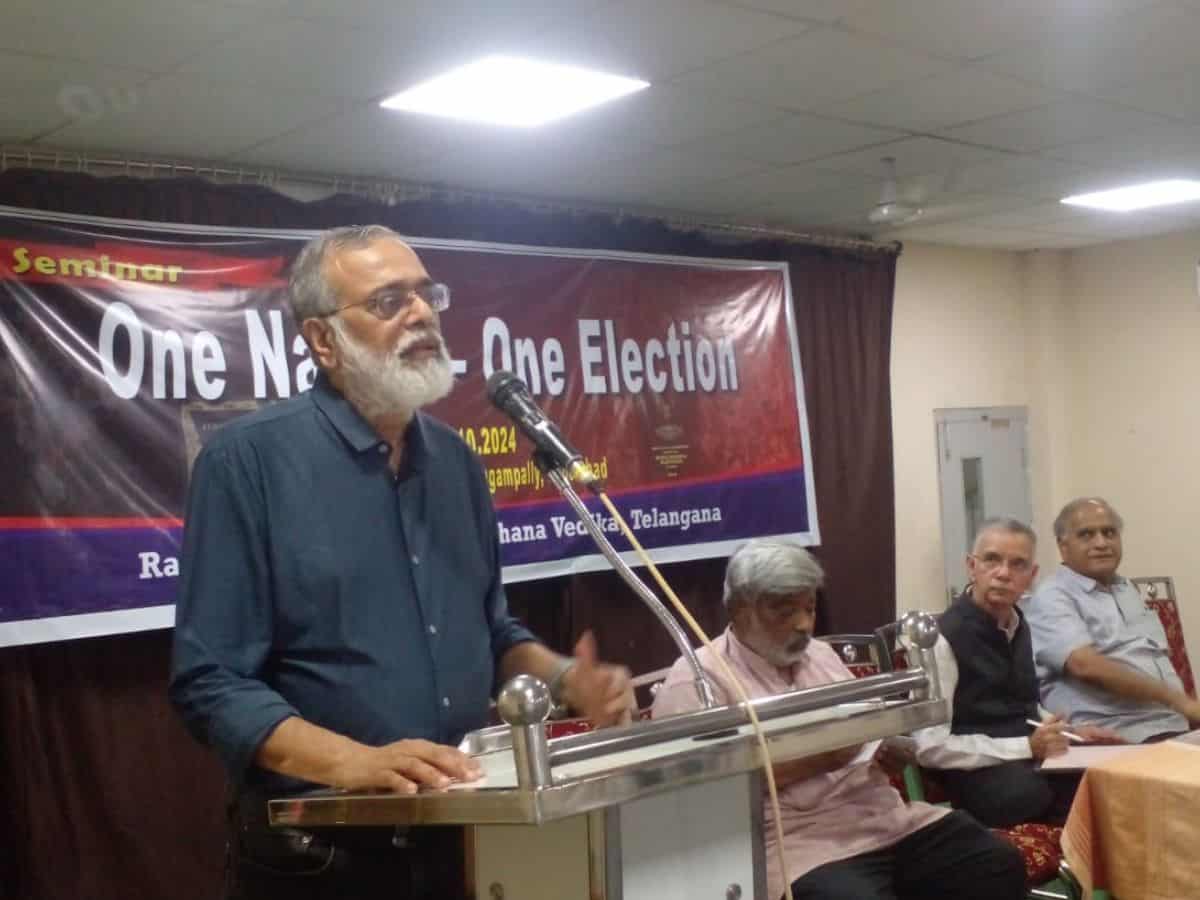
Hyderabad: Newsclick editor-in-chief of Prabir Purkayastha termed ‘one nation-one election’ as perhaps one of the weakest slogans Bharatiya Janata Party (BJP) has presented by itself.
He was addressing a seminar on ‘One Nation-One Election’ held at Sundarayya Vignana Kendram on Saturday evening, where he spoke about the background behind the idea, the possibilities if implemented, and what needed to be done to save the Constitution and the nation’s diversity in all their forms.
He said it started in 2014 with the idea of Rashtriya Swayamsevak Sangh (RSS) to have ‘one leader- one nation.’
“And Modi became that leader,” Purkayastha voiced.
The senior journalist felt that the ‘one leader’ concept had weakened before the 2019 elections, but the Pulwama blast reignited the nationalist sentiments.
“All attempts to centralise the powers, an attempt to make electoral bonds stay with them, still didn’t work in the recently concluded 2024 elections. One leader’s charisma became weak, as he was no longer the vote-getting machine like BJP thought,” he observed.
Purkayastha felt that there were two possibilities if a state assembly couldn’t complete its full term after ‘one nation one election’ was implemented. “Firstly, if a government falls in 2.5 years, the President’s rule can be imposed for the next 2.5 years, which is unconstitutional as it places the state under the control of the Centre. Secondly, if an election is held again, the new government will have only 2.5 years to stay in power, which is also depriving the people of the assembly they are entitled to,” he said.
In either of the cases, he said the BJP-RSS’s claim of reducing the expenditure on elections will fall flat, and the utility of their idea in terms of money gets defeated.
He asserted the only argument he could think of about the slogan was that BJP thought Prime Minister Narendra Modi was a ‘magic wand’; and if they had an edge in the national elections, the ‘one leader’ concept could impose control on other states.
“BJP, with all the money it has, with its organisation, was able to control the mainstream media. This can be witnessed in how critical editorial pieces against the Centre are being cut out. Voices of the dissent are being gagged. But despite this, it is the energy of ordinary people expressing their views via social media tools such as YouTube, Instagram reels, making fun of political leaders, created what we have observed in the last elections,” he said.
Recalling the BJP’s attempts to create George Orwell’s ‘Ministry of Truth’ by trying to bring “fact-check” which was buried by the courts, he said that the saffron party also tried to make all the YouTubers to register themselves.
“There are around 600 million cell phone users in the country. Can they all be registered? This is fracturing the monolithic image of the BJP. This threatens them. The truth of the people is what the truth is. This is what we have seen in the last elections, and now BJP is wondering how they can bring back their idea of ‘one leader one nation’,” Purkayastha opined.
What is the duty of social activists
The Newsclick editor said that in the current epoch, the duty of civil society was to take cues from Vladimir Lenin, who used his newspaper “Iskra” as the vanguard of the proletariat.
“We need to think what is the organiser of our movement, how to bring 600 million cell phone users together. If we want to do that, we should look at social media as the instrument for organising the party for the social movements,” he suggested.
The background- timeline of ‘One Nation- One Election’ idea
Giving the background of the ‘one nation- one election’ idea, High Court advocate G Vidyasagar remarked the idea was first brought forward after 1971 when state assemblies kept getting dissolved due to either a hung verdict or a no-confidence motion.
Vidyasagar said that when the idea was proposed in 1983. An exercise was conducted when it was believed that if simultaneous elections were held there was a 75% chance of the party which formed the government at the Centre forming governments in the states. And if the assembly elections were held 6 months after the Lok Sabha elections, there was a 55% chance.
“The 2018 law commission submitted its report observing that the idea would be difficult to implement and it would require an amendment of the Representation of the People’s Act. Furthermore, the rules of the assembly and the Parliament needed to be amended. Though another law commission could be constituted, the Centre by passed procedures and formed a committee chaired by a former President of India, who doesn’t have a legal standing,” he noted.
Vidyasagar pointed out that only supportive representations were included in the committee’s report and those against the idea were not. The committee gave its report in 2023 and in September 2024 the Union cabinet approved its recommendations.
He said that it needs at least 50% of the state assemblies to approve it, and it needs to be enacted through a Bill in the Parliament before implementing the “one nation- one election” idea of the RSS and the BJP.



